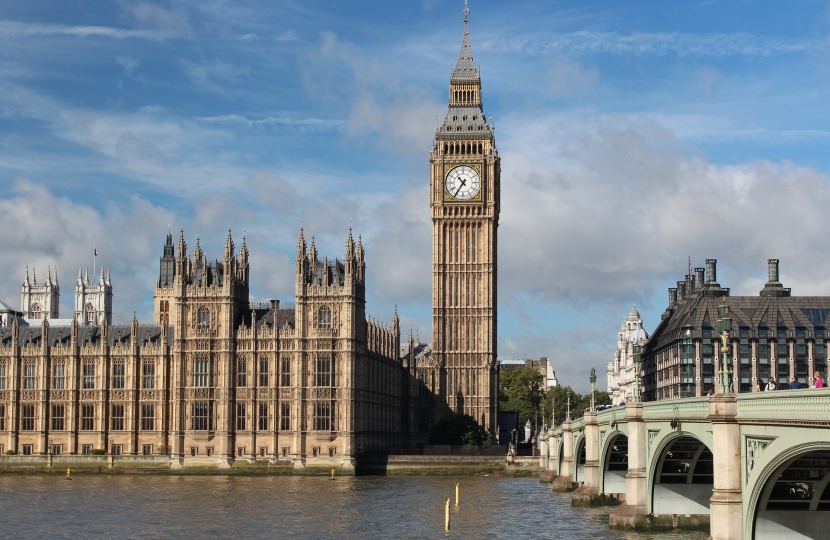
The landmark Domestic Abuse Bill will help transform the response to domestic abuse, helping to prevent offending, protect victims and ensure they have the support they need.
Today (Monday 6th July) James is in Parliament for the final stages of the Domestic Abuse Bill before it passes to the House of Lords.
James is pleased that the Bill commands strong cross-party support, exhibiting a common hope to protect and support victims of domestic abuse including children, and to ensure that perpetrators are brought to justice.
In December 2019 the Government was elected with a manifesto commitment to 'support all victims of domestic abuse and pass the Domestic Abuse Bill' originally introduced in the last Parliament. Tragically, there are 2.4 million victims of domestic abuse a year aged 16 to 74 (over 60% of whom are female) and more than one in ten of all offences recorded by the police are domestic abuse-related.
Welcoming the passing of the Bill in the House of Commons, James Wild MP said -
Domestic abuse is an appalling crime perpetrated on victims and their families in their own homes.
This Bill will put into law a new definition that recognises that domestic abuse is not just physical violence - it is also about emotional, coercive and controlling behaviour or economic abuse. I hope this Bill helps to provide the hope and faith that victims need to come forward to report their experiences and seek the support that is available.
James is also pleased that the Pandora Project in King's Lynn has received £80,000 in government funding to continue their vital work supporting vulnerable women. The money will be used to pay for a vehicle to help staff get to victims in isolated parts of the county.
Ten organisations across Norfolk will get almost £250,000 collectively, amid concern that lockdown has contributed to increased violence, while social distancing regulations has meant the way people are helped has had to change. Norfolk’s Police and Crime Commissioner, Lorne Green, said: “This fund is a lifeline for the many organisations which have, in many cases, had to completely change their way of working and move to a more agile and digital method of delivery.”
Background
In the year ending March 2019, an estimated 2.4 million adults aged 16 to 74 years experienced domestic abuse in the last year (1.6 million women and 786,000 men).
The prevalence of domestic abuse has reduced from 8.9% in the year ending March 2005 to 6.3% in the year ending March 2019; this indicates a gradual, longer term downward trend.
The Domestic Abuse Bill aims to ensure that victims have the confidence to come forward and report their experiences, safe in the knowledge that the state will do everything it can, both to support them and their children and pursue the abuser. In summary, it will:
- create a statutory definition of domestic abuse, emphasising that domestic abuse is not just physical violence, but can also be emotional, coercive or controlling, and economic abuse
- establish a Domestic Abuse Commissioner, to stand up for victims and survivors, raise public awareness, monitor the response of local authorities, the justice system and other statutory agencies and hold them to account in tackling domestic abuse
- provide for a new Domestic Abuse Protection Notice and Domestic Abuse Protection Order
- place a duty on local authorities in England to provide support to victims of domestic abuse and their children in refuges and other safe accommodation
- prohibit perpetrators of abuse from cross-examining their victims in person in the family courts in England and Wales
- create a statutory presumption that victims of domestic abuse are eligible for special measures in the criminal courts (for example, to enable them to give evidence via a video link)
- enable domestic abuse offenders to be subject to polygraph testing as a condition of their licence following their release from custody
- place the guidance supporting the Domestic Violence Disclosure Scheme (“Clare’s law”) on a statutory footing
- ensure that where a local authority, for reasons connected with domestic abuse, grants a new secure tenancy to a social tenant who had or has a secure lifetime or assured tenancy (other than an assured shorthold tenancy) this must be a secure lifetime tenancy
- extend the extraterritorial jurisdiction of the criminal courts in England and Wales, Scotland and Northern Ireland to further violent and sexual offences
A number of new government amendments have been introduced to strengthen the Bill further including:
- a new provision that children who see, hear or experience the effects of domestic abuse are also to be regarded as a victim of domestic abuse;
- special measures to support victims of domestic abuse involved in legal proceedings;
- a prohibition against domestic abuse perpetrators cross-examining their victims in person in family proceedings (matching the existing prohibition in the criminal courts); and
- ending the so-called “rough sex" defence, making clear that consent to serious harm for sexual gratification would not be a defence and, by extension, nor would consent apply where such sexual activity resulted in the victim’s death.
James is clear that the debate's focus is on a Domestic Abuse Bill and so will not be supporting amendments that relate to other policy areas, such as abortion.
Support for migrant victims
James is pleased that the Government is committed to doing what it can to support migrant victims of domestic abuse.
In 2012, the Coalition goverment introduced the Destitution Domestic Violence Concession (the Concession) and the Domestic Violence Indefinite Leave to Remain Scheme (the Scheme) to support migrant victims of domestic abuse who are living in this country via a partner visa, or on visas as a partner of a refugee or of a member of the armed forces. The Concession permits them to receive welfare payments, support and safe accommodation, and the Scheme allows them to apply for the Indefinite Leave to Remain that they would have secured had their relationship not been abusive.
The Concession and Scheme are not available to people who enter the country on other visas, such as visitor, student or work visas, or who are here illegally.
The government have listened to concerns raised by charities working with migrant victims and want to improve the support such victims receive to help them recover from domestic abuse. That is the Government are investing £1.5 million in the Support for Migrant Victims pilot scheme, to be launched later this year, that will support migrant victims of domestic abuse who do not have access to public funds to access safe accommodation and services. The pilot scheme will not only support more people to find safe accommodation, but it will also help gather the data that is needed to develop sustainable solutions for all migrant victims of domestic abuse over the long-term.
Read more here.


